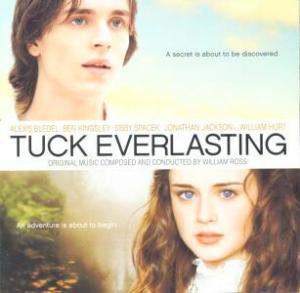William ROSS
Tuck Everlasting
OST
WALT DISNY RECORDS 60063-7 [42:09]

William Ross' score for the screen adaptation of Natalie Babbitt's fantasy about a never-aging woodland family, "Tuck Everlasting," is strangely, warmly familiar. If you have ever felt at home in a foreign land... that is the feeling here.
Folksy orchestrations accentuate the film's atmosphere of rural Maryland, America, but Ross touches on a variety of styles from around the globe, noting in the press release that a position on the music "was that it also not be geographically obvious." It isn't. The invented Tuck Band draws from such disparate sources that the credits include the general citation of 'ethnic flutes' (devotees of fellow critic Paul Tonks are already aware that this translates as "What the heck are those instruments?"), and the more traditional moments of the underscore rarely play unchecked. The primitive beat of 'Cave Dance' so shortly after the piano 'Elegy' would be enough to boggle the mind, yet otherworldly whistling, fiddles mingling with unusual percussion, music-box themes, broadly played strings, and waves of melodrama feature, as well. This is a strange assortment.
But few of the aforementioned ideas are entirely alien. In particular, broadly played strings and waves of melodrama are perfectly standard fare in movies for young people. Now, consider that the composer took ingredients that are readily available and made them into an agreeable stew. This is where we feel the warmth. What might be puerile, coarse, or common in itself finds a balance in combination. Here is that rare bird in the Arts, a collection that is more than the sum of its parts.
Working against the soundtrack is a lack of distinctive themes. There are melodies, rest assured, but only the whistled fragments linger. I might suggest that this is because they are underutilized, except the themes are strictly by-the-book and unlikely to work better with repetition.
I again delight in the fact that the musicians receive a full listing in the album booklet, although the Powers That Be cheaped-out on notes and track times. Maria Newman, Alfred's daughter, is among the credits--the Newman dynasty extends to all areas of filmusic. William Ross' score for "Tuck Everlasting" expertly stretches in its own domain; the results are not timeless, but charming nonetheless.
Jeffrey Wheeler

Return to Index